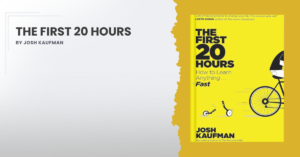Title: Make Your Bed: Little Things That Can Change Your Life… And Maybe the World
Author: Admiral William H. McRaven
Year: 2017
Pages: 144
Make Your Bed by Admiral William H. McRaven is like a friend giving you solid life advice. The main idea is simple: start your day and make your bed.
It sounds small, but the author, a tough Navy SEAL, explains how this tiny task sets a positive tone for the whole day.
He shares stories from his military life to show that discipline and teamwork are key to success.
Make Your Bed teaches us important stuff easily.
First, it says life can be tough, but making your bed helps you handle problems better.
Second, it talks a lot about working together.
McRaven shows that we’re stronger when we help each other.
In a nutshell, Make Your Bed is a friendly guide to a better life. It tells us that small actions, like making your bed, can lead to big success.
The book is full of stories and simple lessons that anyone, from any background, can understand and use in their own life.
As a result, I gave this book a rating of 8.5/10.
For me, a book with a note 10 is one I consider reading again every year. Among the books I rank with 10, for example, is Dale Carnegie’s How to Win Friends and Influence People.
3 Reasons to read Make Your Bed
Discipline Breeds Success
McRaven emphasizes the importance of discipline in achieving personal and professional success. By starting your day with the simple act of making your bed, you cultivate discipline that permeates every aspect of your life.
Resilience in Adversity
Life is unpredictable, and challenges are inevitable. Make Your Bed teaches us how small, consistent actions, like making your bed, can instil resilience. These habits prepare you to face larger challenges with a composed and resolute mindset.
The Power of Teamwork
Through anecdotes from his military career, McRaven illustrates the significance of teamwork. Making your bed is not just an individual task; it’s a collective effort that fosters a sense of responsibility and unity, vital in both military operations and everyday life.
Book Overview
Make Your Bed is a concise and impactful guide that distils essential life lessons from the author’s experiences as a Navy SEAL.
At its core, the book emphasizes the transformative power of seemingly mundane tasks, with the act of making one’s bed serving as a metaphor for instilling discipline and setting the tone for success.
McRaven’s straightforward writing style and relatable anecdotes create a compelling narrative accessible to readers of all backgrounds, making the book a valuable resource for personal development.
Make Your Bed unfolds through a series of ten life lessons derived from McRaven’s military career.
These lessons extend beyond the confines of military life, offering practical insights for individuals seeking to navigate the challenges of everyday existence.
One of the central themes from Make Your Bed is the idea that small, disciplined actions can lead to significant personal and professional achievements.
By starting the day with the accomplishment of making one’s bed, individuals develop a mindset of discipline that ripples through other aspects of their lives.
Drawing on examples from SEAL training and missions, Make Your Bed illustrates how working together, acknowledging each other’s strengths, and supporting one another are crucial components of achieving success in any endeavour.
The book’s anecdotes provide real-world examples of the power of collective effort, making it relevant not only for military enthusiasts but for anyone aspiring to create positive change in their lives.
Make Your Bed also explores the concept of resilience in the face of adversity.
McRaven encourages readers to confront their fears head-on, highlighting the idea that overcoming challenges, no matter how small, contributes to building mental fortitude.
This emphasis on resilience ties into the broader theme of adaptability – a quality essential for navigating life’s uncertainties.
The author’s experiences as a Navy SEAL underscore the importance of being flexible and responsive to unexpected situations, urging readers to cultivate a mindset that embraces change.
In conclusion, Make Your Bed is more than a guide to tidier morning routines; it’s a roadmap for personal growth and success.
McRaven’s insights, drawn from a distinguished military career, are presented in a manner that resonates with readers from all walks of life.
What are the Key Ideas
Importance of Routine and Discipline
The book stresses the significance of establishing a daily routine and cultivating discipline. Make Your Bed underscores how consistent habits and disciplined actions contribute to personal development and success, creating a foundation for tackling more significant challenges.
Leadership Amid Adversity
McRaven shares insights into effective leadership by emphasizing the ability to navigate and lead through challenging situations. The book delves into the author’s experiences as a Navy SEAL, illustrating how leaders must adapt, make tough decisions, and inspire their teams in the face of adversity.
Resilience in the Face of Failure
McRaven discusses how setbacks and failures are inevitable but essential components of personal growth. Learning to bounce back from failures is portrayed as a crucial skill in the journey toward success.
Attention to Detail in Planning
McRaven explains how thorough preparation, strategic thinking, and meticulous attention to detail contribute to mission success, drawing parallels to the importance of such practices in everyday life.
What are the Main Lessons
My Book Highlights
If you make your bed every morning, you will have accomplished the first task of the day. It will give you a small sense of pride and it will encourage you to do another task and another and another. By the end of the day, that one task completed will have turned into many tasks completed. Making your bed will also reinforce the fact that little things in life matter. If you can’t do the little things right, you will never do the big things right. And, if by chance you have a miserable day, you will come home to a bed that is made—that you made—and a made bed gives you encouragement that tomorrow will be better. If you want to change the world, start off by making your bed
I realized that the past failures had strengthened me, taught me that no one is immune from mistakes. True leaders must learn from their failures, use the lessons to motivate themselves, and not be afraid to try again or make the next tough decision
At some point, we will all confront a dark moment in life. If not the passing of a loved one, then something else that crushes your spirit and leaves you wondering about your future. In that dark moment, reach deep inside yourself and be your very best
Without courage, men will be ruled by tyrants and despots. Without courage, no great society can flourish. Without courage, the bullies of the world rise up. With it, you can accomplish any goal. With it, you can defy and defeat evil
It is easy to blame your lot in life on some outside force, to stop trying because you believe fate is against you. It is easy to think that where you were raised, how your parents treated you, or what school you went to is all that determines your future. Nothing could be further from the truth. The common people and the great men and women are all defined by how they deal with life’s unfairness
Remember… start each day with a task completed. Find someone to help you through life. Respect everyone. Know that life is not fair and that you will fail often. But if you take some risks, step up when times are toughest, face down the bullies, lift up the downtrodden, and never, ever give up—if you do these things, then you can change your life for the better… and maybe the world
Well, as you can see, Make Your Bed provides a blueprint for personal growth and success.
Its simplicity, relatable anecdotes, and universal lessons make it accessible to readers from all walks of life.
Whether you seek to enhance discipline, understand the power of teamwork, confront fears, appreciate the importance of details, or embrace adaptability, this book serves as a valuable roadmap.
It transforms seemingly small actions into powerful tools for building resilience, achieving success, and fostering a positive mindset.
I am incredibly grateful that you have taken the time to read this post.
Do you want to get new content in your Email?
Do you want to explore more?
Check my main categories of content below:
- Agile
- Blog
- Book Notes
- Career
- Leadership
- Management
- Managing Yourself
- Productivity
- Project Management
- Technology
- Weekly Pulse
Navigate between the many topics covered in this website:
Agile Art Artificial Intelligence Blockchain Books Business Business Tales Career Coaching Communication Creativity Culture Cybersecurity Design DevOps Economy Emotional Intelligence Feedback Flow Focus Gaming Goals GPT Habits Health History Innovation Kanban Leadership Lean Life Managament Management Mentorship Metaverse Metrics Mindset Minimalism Motivation Negotiation Networking Neuroscience NFT Ownership Parenting Planning PMBOK PMI Politics Productivity Products Project Management Projects Pulse Readings Routines Scrum Self-Improvement Self-Management Sleep Startups Strategy Team Building Technology Time Management Volunteering Work
Do you want to check previous Book Notes? Check these from the last couple of weeks:
- Book Notes #123: The Personal MBA by Josh Kaufman
- Book Notes #122: The First 20 Hours by Josh Kaufman
- Book Notes #121: A World Without Email by Cal Newport
- Book Notes #120: Storynomics by Robert McKee and Thomas Gerace
- Book Notes #119: Getting Things Done by David Allen
Support my work by sharing my content with your network using the sharing buttons below.
Want to show your support tangibly? A virtual coffee is a small but nice way to show your appreciation and give me the extra energy to keep crafting valuable content! Pay me a coffee:





